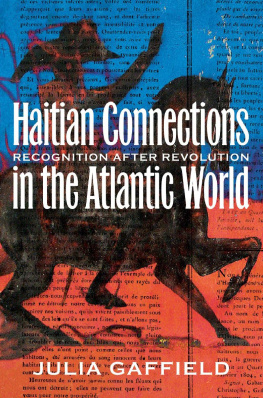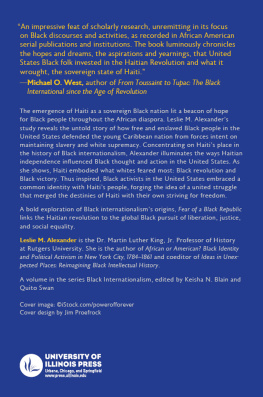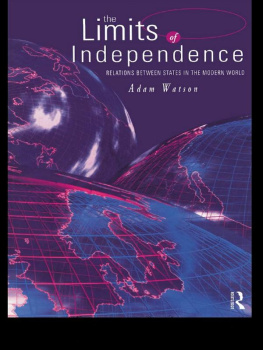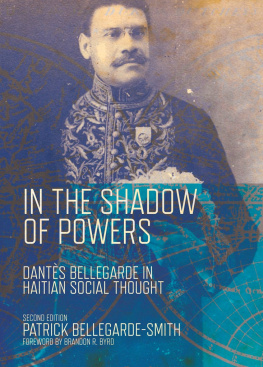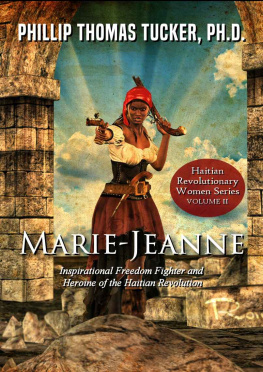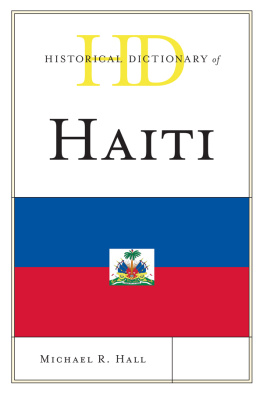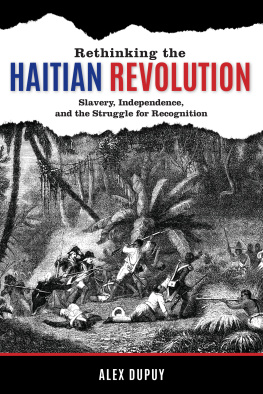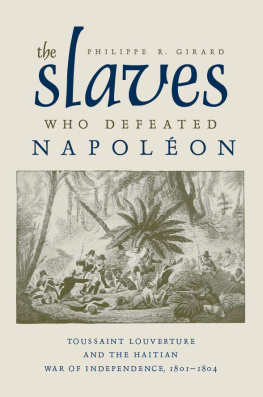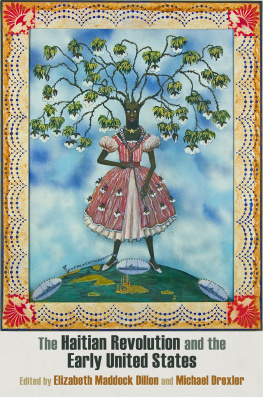Haitian Connections in the Atlantic World
Haitian Connections in the Atlantic World
Recognition after Revolution
Julia Gaffield
The University of North Carolina Press
Chapel Hill
2015 The University of North Carolina Press
All rights reserved
Designed by Alyssa DAvanzo
Set in Quadraat by codeMantra, Inc.
Manufactured in the United States of America
The paper in this book meets the guidelines for permanence and durability of the Committee on Production Guidelines for Book Longevity of the Council on Library Resources.
The University of North Carolina Press has been a member of the Green Press Initiative since 2003.
Cover illustration: Mural of Jean-Jacques Dessalines in Port-au-Prince, Haiti, and original printed copy of the Haitian Declaration of Independence, issued by the Government of Haiti (photographs by the author)
Library of Congress Cataloging-in-Publication Data
Gaffield, Julia, author.
Haitian connections in the Atlantic World: recognition after revolution / Julia Gaffield.
pages cm
Includes bibliographical references and index.
ISBN 978-1-4696-2562-1 (pbk : alk. paper) ISBN 978-1-4696-2563-8 (ebook)
1. HaitiForeign relations18041844.
2. HaitiHistory18041844. I. Title.
F1922.G34 2015
972.9404dc23
2015018761
To my mum and dad, Pam and Chad Gaffield, whom I love and appreciate so very much
Contents
CHAPTER ONE
I Put Fear in the Hearts of Those Who Engage in This Trade: French Efforts to Isolate Haiti in the Atlantic World
CHAPTER TWO
I, Leader of a Country, Treat for My Citizens: Haiti and Jamaica after the French Defeat
CHAPTER THREE
Legislators of the Antilles: British Regulation of Trade with Haiti
CHAPTER FOUR
Aiming a Blow at Their Very Vitals: U.S. Interdiction of Trade with Haiti
CHAPTER FIVE
The States of Hayti and the British Empire
Figures
1. Currents of Air
2. Map of the Caribbean
3. Draft map from the 1801 accord between Saint Domingue and Jamaica
Acknowledgments
In 1816, King Henry I of Haiti wrote to British abolitionist Thomas Clarkson to express his gratitude. I do not know of any better way of thanking you, he wrote, for your wise and good advice than to beg you to continue it. Many times I have thought about these words in reflecting on my good fortune for having such a wonderful mentor, colleague, and friend. I am forever indebted to Laurent Dubois to whom I offer a million sincere thanks for providing invaluable guidance on academia and life. I am truly lucky.
Early on, I benefited from the kindness, intellectual rigor, and encouragement of a number of scholars. Melanie Newton first introduced me to Caribbean history and invited me to participate in the scholarly community in Toronto. Ken Mills showed me how to look at primary sources and demonstrated the importance of asking thoughtful questions. Michael Wayne introduced me to the art of storytelling in history, and his kind advice, tough teaching, and encouragement over the years have been invaluable. I would also like to thank Michele Johnson, David Trotman, Adrian Shubert, and Marcel Martel, who supported my research as I began exploring Haitis connections with the broader Atlantic World.
I am lucky to have benefited from the thoughtful comments of a number of scholars who read earlier drafts. Elizabeth Fenn was always available with honest, kind, and tough critiques. Deborah Jenson pushed me to think more creatively and inspired me with her passion and drive. Barry Gaspar continually renewed my love for history. Vince Brown has shown me how to think about history beyond the texts that dominate our field and encouraged me to explore new ways of researching and teaching. I owe great thanks to my writing group and my accountability club, Fahad Bishara, Doug Leonard, Willeke Sandler, Jacob Remes, and Jillian Powers.
I have been welcomed into a collegial, intense, and inspiring group of scholars, and I am grateful for the joy that they bring to academia. I offer my sincere thanks to David Armitage, Lauren Benton, Madison Bell, Jean Casimir, Matt Childs, Marlene Daut, Ada Ferrer, Doris Garraway, John Garrigus, David Geggus, Malick Ghachem, Jean-Pierre Le Glaunec, Eliga Gould, Allan Greer, Philip Kaisary, Jane Kamensky, Paul Lachance, Sue Lanser, Christina Mobley, Graham Nessler, Andrew OShaughnessy, Nathan Perl-Rosenthal, Grgory Pierrot, Jeremy Popkin, Richard Rabinowitz, James Robertson, Rebecca Scott, Matthew J. Smith, Philip Stern, Anoush Terjanian, Chantalle Verna, Laura Wagner, Ashli White, Peter Wood, Charlton (Chaz) Yingling, Paul Youngquist, and Erin Zavitz. I am lucky to have joined a friendly community at Georgia State University, and I thank Michelle Brattain, Jared Poley, and Denise Davidson for their support.
Henry Christophe to Thomas Clarkson, 18 November 1816, in Griggs and Prator, Henry Christophe and Thomas Clarkson, 101.
Archivists and librarians are key to good research projects, and I had the good fortune of collaborating with many. In particular, Patrick Tardieu at the Bibliothque Haitienne des Pres du Saint-Esprit in Haiti has been extremely generous and inspiring in his enthusiasm for collaboration in archival research. Poul Erik Mouritzen at the Danish National Archives saved me from tears and kindly allowed me access to their stacks after an untimely truck accident in their West India collection. I would also like to thank Chris Barnes at The National Archives of the United Kingdom for keeping me company over lunch and helping me track down and follow up on sources. Finally, I had one of the greatest archival experiences at the National Library of Jamaica, and I would like to thank the staff in the manuscript division for their help.
I owe great thanks to David Jarmul, Camille Jackson, and the rest of the crew at the Office of News and Communications at Duke University for taking an interest in my research and for helping the public learn a bit more about Haiti. I have thoroughly enjoyed engaging with a community beyond the university, and I am grateful to the journalists that made this possible, in particular those at the New York Times, the Times of London, and the Globe and Mail. This experience helped me see the value of connecting academic research to a broader public and to current events. I saw this approach at work at the New-York Historical Society, and I thank the members of the staff for their scholarly and community engagement.
This project would not have been possible without generous funding from a number of institutions. The Social Sciences and Humanities Research Council of Canada; the Canada-US Fulbright Program; the Center for Latin American and Caribbean Studies and the Franklin Humanities Institute at Duke University; the Harvard Atlantic World Research Seminar; the Andrew W. Mellon Sawyer Seminar at Brandeis University (201314); the Department of History, the College of Arts and Sciences, and the Center for Latin American and Latino Studies at Georgia State University; the Latin American and Caribbean Section of the Southern Historical Association; the Robert H. Smith International Center for Jefferson Studies; the University of Warwick; and the John Carter Brown Library provided the funds for my research trips in seven different countries and the time and backing that I needed to complete this project. I thank all of these institutions for their help and support. Many thanks to the members of the staff at William and Mary Quarterly and at the Journal of Social History, who graciously allowed me to draw upon material in my articles for Chapters 2 and 5. Thank you to the David Rumsey Historical Map Collection for allowing me to use one of their maps in this book and for providing an invaluable research and teaching resource.
Next page
